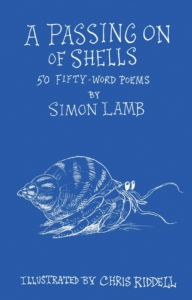
This article is in the Other Articles and Poetry Categories
Why Poetry?
Simon Lamb explains, with reference to his debut collection A Passing on of Shells.
 The title of my debut collection of poetry is A Passing On of Shells, which is a phrase taken from a poem of which I’m very fond, found towards the back of the book. But it’s the collection’s subtitle – 50 Fifty-Word Poems – that has provoked the most questions. Why fifty words? Why fifty poems? And, for that matter, why poetry?
The title of my debut collection of poetry is A Passing On of Shells, which is a phrase taken from a poem of which I’m very fond, found towards the back of the book. But it’s the collection’s subtitle – 50 Fifty-Word Poems – that has provoked the most questions. Why fifty words? Why fifty poems? And, for that matter, why poetry?
To begin to answer those questions, I need to take you back — to 2014, to be precise. That year, that autumn, I remember trying my hand at a particular writing prompt: to write a story in just fifty words. Such prompts exist in all manner of guises, from the famous example of the six-word story to the roomier world of micro-fiction’s one hundred words. But fifty, to me, seems to present a delicious challenge: the Goldilocks number. Not too short. Not too long. Just right.
At that time, back in 2014, I’d been flirting more and more with the writing of poetry, having previously written most of my work as script for the stage. My mind had been captivated that year by a very epic and very famous poem called Tam o’ Shanter, a masterwork by the universally-known 18th century Scottish poet Robert Burns. Inspired by its mesmeric rhyming lines, and in an attempt to spark in others the same joy Burns’s verse ignited in me, I found myself creating work with the same structure (iambic tetrameter), writing on subjects as diverse as Scout camps and – and, yes, I know this is really random and really deserves its own story to do it justice – Sainsbury’s! I was writing, almost inadvertently, poetry, and always with a goal of entertaining an audience — whether around a campfire . . . or in the atrium of a supermarket!
In the process, I was discovering that poetry could be dramatic, funny, emotional, wise, silly; so very often, all at the same time. That was something the teenage me just didn’t get from the poetry he was taught in school, with him thinking all poems were written by crusty old guys in crusty old books from hundreds of crusty old years ago and of no relevance to him today. (As a brief aside, perhaps the biggest shock I’ve experienced in the poetry world was learning years later that John Keats was in fact only twenty-five years old when he wrote To Autumn.) The doors to this unexplored world of poetry were finally creaking open for me. Finally, I wanted to learn more about this almost undefinable art-form. Finally, I wanted to play!
And, thus, the blank page became my new theatre.
I can’t say for certain what it was that made me pick up my pen and write a second fifty-word poem after constructing the first in response to the writing prompt. I can only assume it was because I’d found the writing of the first to be fun. And I can’t say for certain what it was that made me pick up my pen and write a third, or a fourth. What I do know is that, as a graduate in mathematics, the prospect of fifty such fifty-word poems felt mightily appealing. Each one, a fun challenge, a delectable puzzle. Sometimes frustrating; always fun!
Within a year, I’d completed the fifty poems. And that was that. 2015, and the project was done.
Only, it wasn’t. Every now and then, I’d scribble another wee fifty-worder and file it away, and then, in 2020, when everything started to shut down, I took the project out of a drawer and dusted it off, for no other reason than having something concrete on which to focus my time while the world was ending, grateful for the certainty of the Goldilocks number.
And now, in 2023, Scallywag Press are publishing my debut collection of poetry – being fifty fifty-word poems – featuring some from the original tranche alongside some from more recent years, with fifty incredible illustrations by the inexhaustibly talented Chris Riddell; each double page spread, a theatre, in which we invite you to play, to explore, to create.
Because that’s what poetry is: a blank page upon which can be flourished entire universes. By playing. By exploring. By creating.
In bringing this article to an end, I hope to have answered those frequently asked questions as provoked by the subtitle of my debut poetry collection. Why fifty words? Why fifty poems? Why poetry? But one question, perhaps, still remains . . .
What happened to that first ever fifty-word poem I wrote, the one inspired by the writing prompt back in the autumn of 2014?
Turn to pages 56 and 57 of A Passing On of Shells — and there it is. Yes, the poem made the cut and is responsible in no small way for the existence of the other forty-nine. Thank you, little writing prompt!





